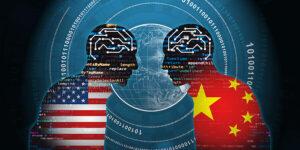In a strategic effort to curb China’s technological edge, the Biden administration has introduced new limitations on U.S. investments in China’s high-tech industries, specifically targeting sectors like semiconductors, quantum computing, and artificial intelligence (AI). These restrictions aim to prevent crucial technologies from enhancing China’s military capabilities.
The rules, announced by Paul Rosen, Assistant Treasury Secretary for Investment Security, are set to take effect on January 2. They closely reflect a proposal from June, providing additional details on the technological criteria and compliance requirements. The regulations specifically bar U.S. investments in Chinese companies that are leading in advanced semiconductor technologies, while investments in older technology firms require notification.
China’s response has been swift and critical, with Foreign Ministry spokesman Lin Jian condemning the U.S. actions and pledging that China will act to protect its interests. The AI investment restrictions focus on the computing power and intended use of AI systems, prohibiting involvement in firms with military applications.
Certain types of investments, such as publicly traded securities, are exempt from these rules. This move aligns with insights from a 2023 report by the Center for Security and Emerging Technology, which highlighted significant American involvement in Chinese AI ventures, particularly at the venture capital stage.
In a parallel showcase of technological ambition, China has successfully launched the Shenzhou 19 spacecraft, embarking on a significant space mission that highlights Beijing’s aspirations to become a dominant space power. The mission includes China’s first female space engineer and marks a step toward a manned Moon mission by 2030.
The Shenzhou 19 crew, now at the Tiangong space station, will spend six months conducting experiments and spacewalks. This launch is part of China’s record 100 planned launches for the year, signaling its determination to outpace the United States in space exploration.
The launch captured public attention, with enthusiastic crowds cheering the taikonauts, China’s astronauts. The BBC, granted exceptional access, witnessed the dramatic liftoff in the Gobi Desert.
President Xi Jinping has made it clear that China’s space ambitions are a long-term goal, stirring concerns in Washington. NASA Chief Bill Nelson recently pointed out the competitive nature of the U.S.-China space race, worrying about potential territorial ambitions on the Moon.
As these developments continue to unfold, technology and space exploration are becoming increasingly critical arenas in the ongoing geopolitical rivalry between the United States and China.


